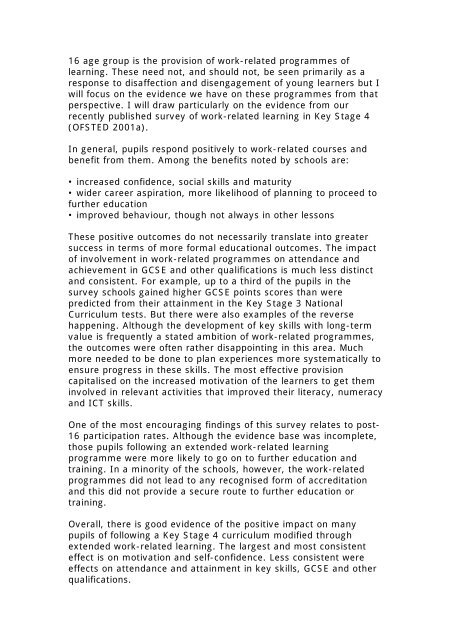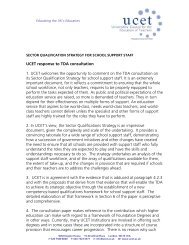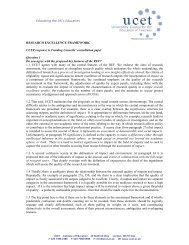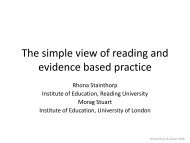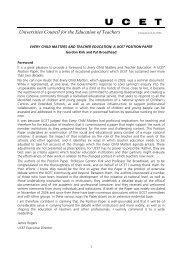The School Curriculum Ten Years Hence - UCET: Universities ...
The School Curriculum Ten Years Hence - UCET: Universities ...
The School Curriculum Ten Years Hence - UCET: Universities ...
Create successful ePaper yourself
Turn your PDF publications into a flip-book with our unique Google optimized e-Paper software.
16 age group is the provision of work-related programmes of<br />
learning. <strong>The</strong>se need not, and should not, be seen primarily as a<br />
response to disaffection and disengagement of young learners but I<br />
will focus on the evidence we have on these programmes from that<br />
perspective. I will draw particularly on the evidence from our<br />
recently published survey of work-related learning in Key Stage 4<br />
(OFSTED 2001a).<br />
In general, pupils respond positively to work-related courses and<br />
benefit from them. Among the benefits noted by schools are:<br />
• increased confidence, social skills and maturity<br />
• wider career aspiration, more likelihood of planning to proceed to<br />
further education<br />
• improved behaviour, though not always in other lessons<br />
<strong>The</strong>se positive outcomes do not necessarily translate into greater<br />
success in terms of more formal educational outcomes. <strong>The</strong> impact<br />
of involvement in work-related programmes on attendance and<br />
achievement in GCSE and other qualifications is much less distinct<br />
and consistent. For example, up to a third of the pupils in the<br />
survey schools gained higher GCSE points scores than were<br />
predicted from their attainment in the Key Stage 3 National<br />
<strong>Curriculum</strong> tests. But there were also examples of the reverse<br />
happening. Although the development of key skills with long-term<br />
value is frequently a stated ambition of work-related programmes,<br />
the outcomes were often rather disappointing in this area. Much<br />
more needed to be done to plan experiences more systematically to<br />
ensure progress in these skills. <strong>The</strong> most effective provision<br />
capitalised on the increased motivation of the learners to get them<br />
involved in relevant activities that improved their literacy, numeracy<br />
and ICT skills.<br />
One of the most encouraging findings of this survey relates to post-<br />
16 participation rates. Although the evidence base was incomplete,<br />
those pupils following an extended work-related learning<br />
programme were more likely to go on to further education and<br />
training. In a minority of the schools, however, the work-related<br />
programmes did not lead to any recognised form of accreditation<br />
and this did not provide a secure route to further education or<br />
training.<br />
Overall, there is good evidence of the positive impact on many<br />
pupils of following a Key Stage 4 curriculum modified through<br />
extended work-related learning. <strong>The</strong> largest and most consistent<br />
effect is on motivation and self-confidence. Less consistent were<br />
effects on attendance and attainment in key skills, GCSE and other<br />
qualifications.


